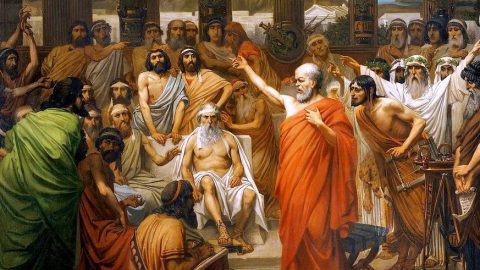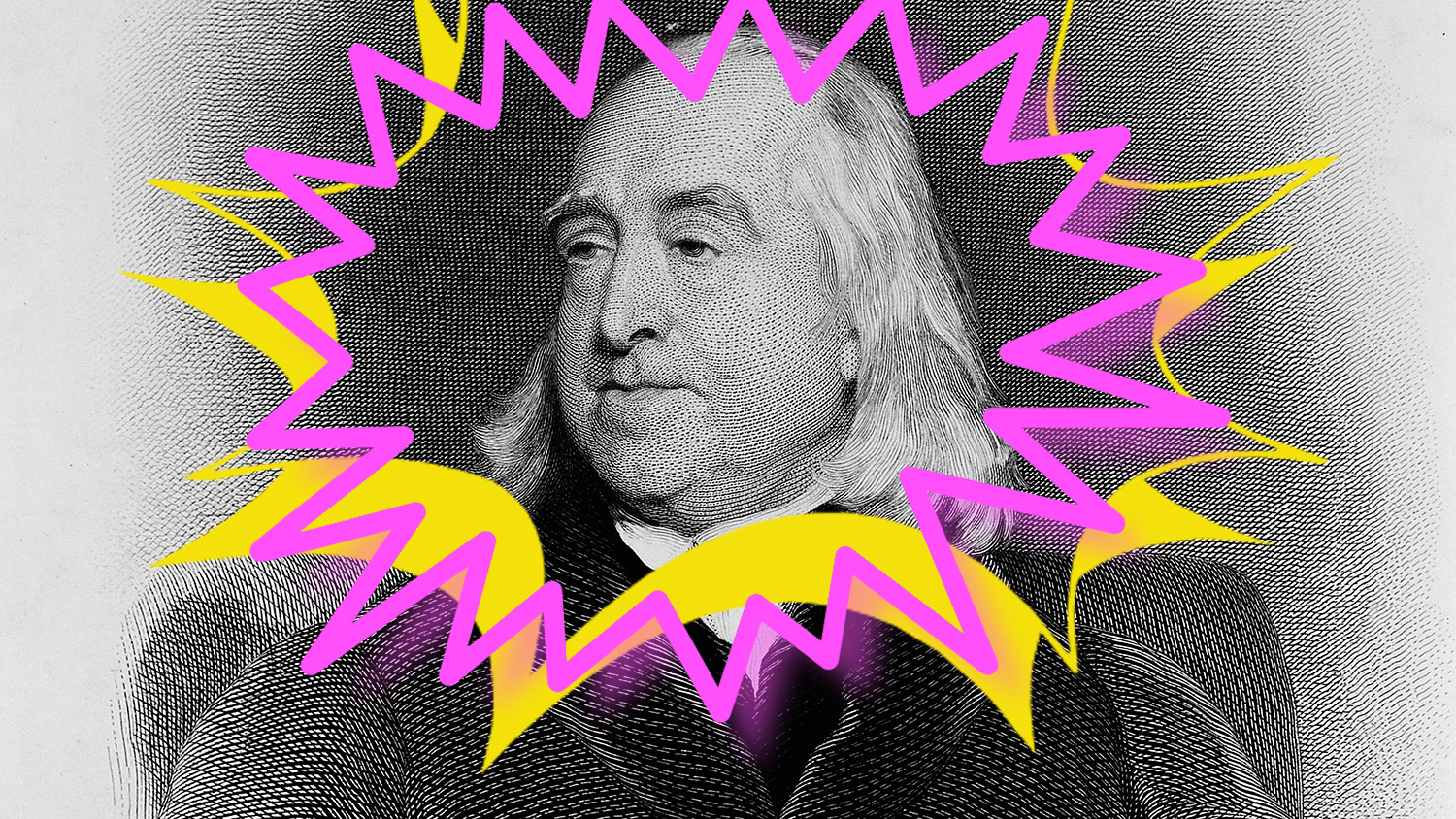- Many philosophers have political ideas but never get a chance to act on them.
- A few esteemed philosophers held the reins of political power, with mixed results.
- Groundbreaking ideas don't always translate into effective politics.
Even philosophers occasionally point out that members of their profession tend to discuss the world rather than change it. This doesn’t mean that every philosopher declines the opportunity to test their ideas in the political arena. Several famous thinkers entered government and tried, with more or less success, to implement their theories. Here we look at six political philosophers who held power — and what they did with it.
Confucius: Minister of Justice, State of Lu
The most important philosopher in Chinese history, Confucius is the founder of the philosophy of Confucianism. Many of his ideas are still prevalent in Chinese and East Asian culture today. His political philosophy centers on ideas of legitimacy, knowing your place in the social order, playing that part well, and the proper following of ritual. He was undoubtedly influenced by his time in office.
Confucius worked several government jobs as a young man before becoming the Minister of Justice for the state of Lu — a small dukedom during the Zhou Dynasty. Already somewhat famous for his teaching, he proposed bold changes to centralize government.
His plan to knock down all the castles not belonging to the central state caused two minor rebellions. The second revolt was ended through Confucius’ decision to move the Duke and other targets of the rebellion into a tower owned by the Prime Minster, who Confucius suspected of being the mastermind of the revolt. Most of the attacking soldiers dared not attack a fortress owned by their employer. The few that entered the building turned back when ordered to. So a revolt was ended by everyone playing their part in the social hierarchy.
Confucius stayed on after this event. However, when the Duke of Lu was allegedly sent 100 racing horses and 80 dancing girls by a neighboring state and ignored his duties, Confucius found an excuse to retire. He then traveled through northern China, teaching his wisdom. He was unable to see many of his ideas enacted during his lifetime. After his return home late in life, he occasionally served as a government advisor while focusing on his teaching.
John Stuart Mill: Member of Parliament (UK)
John Stuart Mill was a 19th-century English philosopher and economist. He is famous for his works on liberalism, logic, utilitarianism, and political economy. He was elected to parliament (representing the City of Westminster) in 1865 as a Liberal, having campaigned in support of women’s suffrage — a radical platform at the time — and became the second member of parliament to call for women’s voting rights.
Later, when he proposed that a Reform Bill expanding suffrage be amended to say “persons” rather than “men,” he struggled to find support. The amendment was defeated by 194 votes to 73. He considered proposing the change to be “perhaps the only really important public service I performed in the capacity as a Member of Parliament.”
He also argued against the brutality of British colonialism in Jamaica, for proportional representation, and in defense of the Irish against the prejudice of the English.
Despite his warning that he would vote as he did, his stances proved unpopular and he lost re-election. The year after his early retirement from politics, he wrote The Subjection of Women, in which he argues for women’s equality in many spheres of life.
Marcus Aurelius: Emperor of Rome
Marcus Aurelius Antoninus was the Emperor of Rome between 161 and 180 AD. He was the last of the “Five Good Emperors,” and his death marked the end of the Pax Romana: a golden age of Roman prosperity and relative stability. He was also a Stoic philosopher famous for notes to himself, which have survived as his “Meditations.”
Meditations provides a hands-on approach to Stoicism, a philosophy dedicated to reaching happiness by following virtues and acting in accordance with nature. Stoics argued that virtue alone was enough for a good life, though mastering your desires for “indifferents” — anything that was neither virtue nor vice — was also an important task. Stoic philosophers also had a model of the Universe and a system of logic.
While Marcus Aurelius generally follows with the Stoic line, he also cites other philosophers and their ideas when it suits his needs. Meditations is endlessly quotable, but it isn’t organized in a way that makes any larger take on Stoicism immediately clear.
His rule was marked by diligence but a limited public works program. He tolerated criticism from playwrights — a rarity in Rome — and showed serious interest and skill in administering the law. There was also conflict, first with Persia and later with Germanic tribes. Large portions of Meditations were written on the edge of the known world with barbarian armies just beyond the horizon. If ever a philosophically inclined ruler needed Stoic thought, it was likely there.
There has been some discussion of how his philosophy may have influenced his erratic and murderous son, Commodus, who succeeded him. Despite that, Marcus Aurelius is often considered the closest to a true philosopher-king that humanity has ever seen.
Bertrand Russell: The House of Lords (UK)
Bertrand Russell was a British philosopher, mathematician, public intellectual, and hereditary member of the House of Lords. One of the founders of analytic philosophy, he addressed a vast range of subjects, with particular interest in logic, set theory, epistemology, and the philosophy of language. However, he ignored aesthetics because, he explained, he didn’t understand it — adding that his critics would claim lack of understanding “has not deterred me from writing on other subjects.”
Russell inherited the title of Earl from his brother, and served from 1931 to 1970 as a Labour peer. However, he rarely showed up and spoke a mere six times. This was motivated by both a lack of interest and the demands of his busy schedule. His speeches concerned peace, disarmament, foreign aid, and world government. His final speech, on nuclear disarmament, is considered his best.
He also stood for election to parliament as an independent liberal in 1907 and as a Labour candidate in 1922 and 1923. He only agreed to do so knowing that the seats were safely in Conservative hands.
Despite his mixed record in institutional politics, he was an activist for most of his life for many causes. Indeed, he was arrested for his activism on several occasions.
Socrates: President for a Day, Athens
Socrates was an Athenian philosopher widely considered the founder of Western philosophy. While a completely accurate picture of what he thought is difficult to piece together in full, we know he spoke on many philosophical issues. In the dialogue Crito, we learn Socrates had great respect for the law and refused to violate it even when it could have saved his life.
Years before the events of that dialogue, Socrates, as a citizen of Athens, was expected to participate directly in political affairs by attending meetings of the Assembly — the democratic collection of enfranchised men. This involved voting and serving in various offices when required. In one fateful instance, he oversaw the Assembly for a day.
During the Peloponnesian War, an Athenian naval victory was soured by the failure of the commanders to rescue men on sinking ships, ostensibly because of a storm. While the storm was considered an “act of god,” and the generals were not accountable for it, public anger at the loss of life led to a trial in the Assembly anyway.
When the names of the officials to oversee the Assembly that day were drawn, Socrates was one of them. While accounts differ, he may have held the role of epistates, or President, of the Athenian government. Upon selection, he pledged to act “in accordance with the law.”
A vote on the guilt of the generals, who admitted to not saving the drowning sailors, was nearly shelved, as Socrates and his fellow caretakers — prytanes — thought the motion was illegal. Upon seeing the crowd’s anger, they all changed their mind, bar one: Socrates. In the end, after some parliamentary maneuvering, the vote did take place. All the generals were found guilty and six of them were put to death. The Athenians later came to regret this decision. Those who introduced the issue were brought up on charges of misleading the Assembly.
Plato tells us in Gorgias that Socrates would later refer to these events darkly, recalling that he was mocked for “not understanding the procedure” — a jab at the illegal actions of his peers.
Pierre-Joseph Proudhon: Member of Parliament (France)
Pierre-Joseph Proudhon was a 19th-century French philosopher, politician, and economist. He coined the term “anarchist” and is widely considered to be the founder of modern anarchist thought. His strain of anarchism, known as Mutualism, calls for relatively free markets, cooperative workplaces, federalized governance through free associations of people, and a revolutionary plan calling for the construction of a new society in the shell of the old.
Despite being an anarchist, he ran for a seat in the French Constituent Assembly after the Revolution of 1848, calling himself a federalist. In office, he participated in the debates over National Workshops: centers to provide work for the unemployed. While he was skeptical of their possible effectiveness, he believed they should remain open until alternatives could be prepared.
He often argued at length for sweeping changes to the national economy, including one occasion when he spoke for three and a half hours for the abolition of private property. This earned him an official vote of censure from the rest of the house. His time in office ended when he was arrested for criticizing President (later Emperor) Napoleon III. By the time he was released, France was again an empire.
In the end, even he admitted that he was not an effective politician. Two of the books he wrote after “leaving” office critiqued representative democracy on the grounds that only a handful of people actually exert power in such an arrangement.






